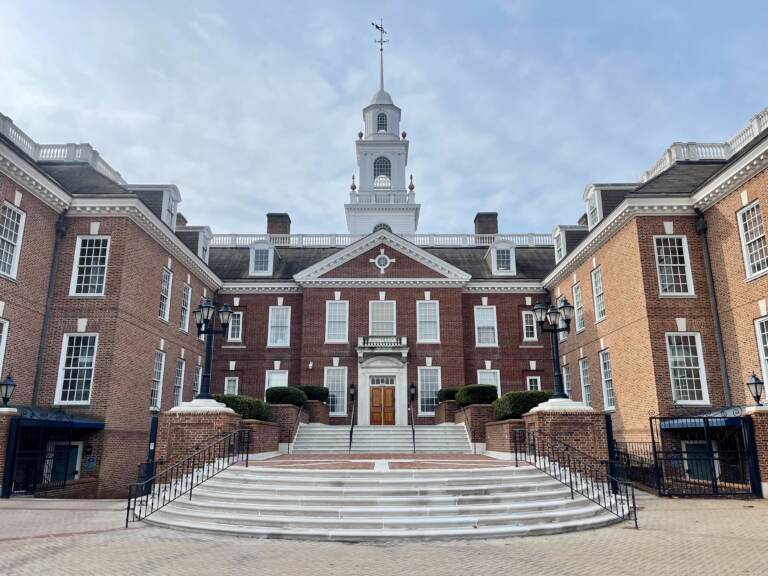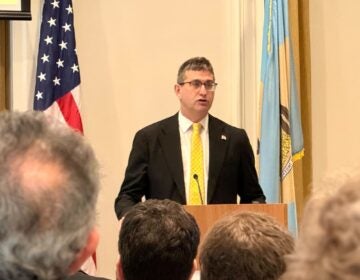‘Life or death’: Delaware lawmakers highlight new abortion access laws in Delaware
The new laws build on top of protections passed in previous years that have made Delaware a sanctuary state for providers and people seeking abortion care.

Legislative Hall in Dover, Delaware. (Johnny Perez-Gonzalez/WHYY)
From Philly and the Pa. suburbs to South Jersey and Delaware, what would you like WHYY News to cover? Let us know!
This story was supported by a statehouse coverage grant from the Corporation for Public Broadcasting.
Delaware has expanded access to abortion after two pieces of legislation recently became law.
One of the bills signed last month by Gov. John Carney requires Medicaid, private health insurance and state employee insurance plans cover services related to termination of pregnancy. Coverage is capped at $750.
The measure, sponsored by House Majority Leader Melissa Minor-Brown, also bans most insurance plans, including ones covering state workers, from charging copays, applying deductibles or adding cost-sharing requirements for abortion-related services. Religious employers can get exempted from having to offer the coverage.
Speakers at Friday’s press conference celebrating the bills noted that women’s ability to access abortion care depended on the state where they live. According to the Guttmacher Institute, a nonprofit that advocates for reproductive rights, 13 states have total abortion bans with limited exceptions. Another six states ban the procedure after six or 12 weeks.
Minor-Brown said Delaware’s protections are important because women in other parts of the country are dying. She pointed to reporting by ProPublica about a Georgia mother who died after a hospital delayed care under the state’s abortion ban.
“For years, medical professionals have warned us that access to abortion is literally a matter of life and death. There are states right now that have abortion laws in effect that date back to the 1800s,” she said. “These outdated, dangerous laws were written at a time when women had no voice, no rights and no agency.”
Stacey Haddock Hassel, board chairperson of Planned Parenthood of Delaware, said the bill is a huge step for abortion access because it will help more patients, including those eligible for Medicaid, afford the procedure.
“When we talk about the impact of this legislation, the size, the limit, we don’t know the number of women who would have been able to access abortion care had they been able to use their Medicaid coverage,” she said. “And we don’t know how many women didn’t have the $500 to come to Planned Parenthood and gave up not knowing their options.”
For Planned Parenthood Delaware’s last fiscal year, 24% of its total patient population were Medicaid recipients and 35% had commercial insurance, a news release said. More than 40% of patients used Planned Parenthood’s self-pay system due to being underinsured or uninsured. Of those, half reported incomes below 250% of the Federal Poverty Level — meaning many of them would have likely qualified for Medicaid.
The other piece of legislation, sponsored by State Sen. Kyle Evans Gay, mandates colleges and universities with student health centers to allow access to medication abortion and emergency contraception.
“It’s never been more clear that in the First State, abortion is health care,” Gay said. “The reality that we have created in our state is not the reality for many women across the nation. And as we witness these ongoing attacks, we recognize that lives are at stake.”
The University of Delaware and Delaware State University both have student health centers and already offer emergency contraception. The act doesn’t take effect until July 2025.
Carney also signed a bill sponsored by Gay in September that requires crisis pregnancy centers to post a notice if they are not a state-licensed medical facility and don’t employ a licensed medical provider. It takes effect in March 2025.
Lawmakers have previously passed laws that established protections for abortion care providers and expanded the list of who can perform abortions. State law also protects out-of-state residents seeking or receiving abortions in Delaware.

Get daily updates from WHYY News!
WHYY is your source for fact-based, in-depth journalism and information. As a nonprofit organization, we rely on financial support from readers like you. Please give today.







